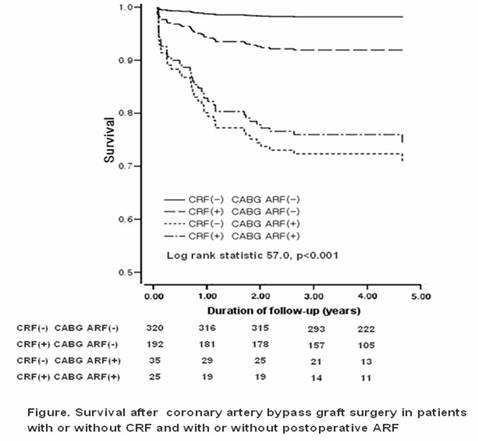| №ЯЗҘЗьҪД : ЖчҪәЕН
|
Бўјц№шИЈ - 510919 231 |
| Acute deterioration of renal function after coronary artery bypass surgery, not underlying renal insufficiency, is an independent predictor of long-term mortality |
| м„ңмҡёлҢҖн•ҷкөҗ мқҳкіјлҢҖн•ҷ лӮҙкіјн•ҷкөҗмӢӨ/м„ңмҡёлҢҖн•ҷкөҗлі‘мӣҗ мҲңнҷҳкё°лӮҙкіјВ№, м„ңмҡёлҢҖн•ҷкөҗлі‘мӣҗ нқүл¶ҖмҷёкіјВІ |
| лҜјнқ¬м„қВ№, мқҙн•ҙмҳҒВ№, 박진мӢқВ№, к°•нҳ„мһ¬В№, кө¬ліёк¶ҢВ№, к№Җмҡ©м§„В№, мҳӨм„ёмқјВ№, к№ҖнҡЁмҲҳВ№, к№Җкё°лҙүВІ, мҶҗлҢҖмӣҗВ№, мҳӨлі‘нқ¬В№, л°•мҳҒл°°В№, мөңмңӨмӢқВ№ |
Background: Postoperative increase in serum creatinine (SCr) is the known to be one of the main determinants for short-term mortality after coronary artery bypass graft (CABG) surgery. However, its association with long-term mortality has not been properly evaluated.
Methods and results: We prospectively enrolled 572 patients who underwent CABG from January 2000 to June 2004. Patients with end-stage renal disease were excluded. The relationship between baseline/change in renal function and long-term mortality was studied. Patients were stratified by 4 groups according to the presence of underlying chronic renal failure (CCr<60ml/min) and perioperative acute renal failure (ARF) defined as 50% increase in SCr from baseline. Median duration of follow-up was 4.4Вұ1.5 years. Survival analysis revealed that the patients with ARF had the worst prognosis (Figure). By Cox proportional hazards model, perioperative ARF was an independent predictor of long-term mortality (HR, 5.71; 95% CI, 2.98 to 10.93). Low ejection fraction (LVEF<50%) and age were also predictors of long-term mortality.
Conclusion : Perioperative ARF is an independent predictor of long-term mortality irrespective of underlying renal function in patients with CABG.
|
|
|
Warning: getimagesize(/home/virtual/circulationadmin/htdocs/econgress/conference/abstract/img_files/CABGARFfigure.jpg) [function.getimagesize]: failed to open stream: No such file or directory in /home/virtual/circulationadmin/new/econgress/conference/manage/schedule/view_abstract.php on line 164

|
|





